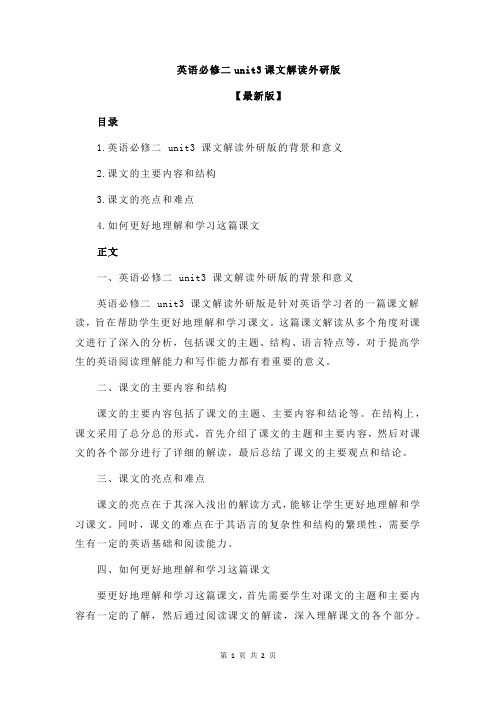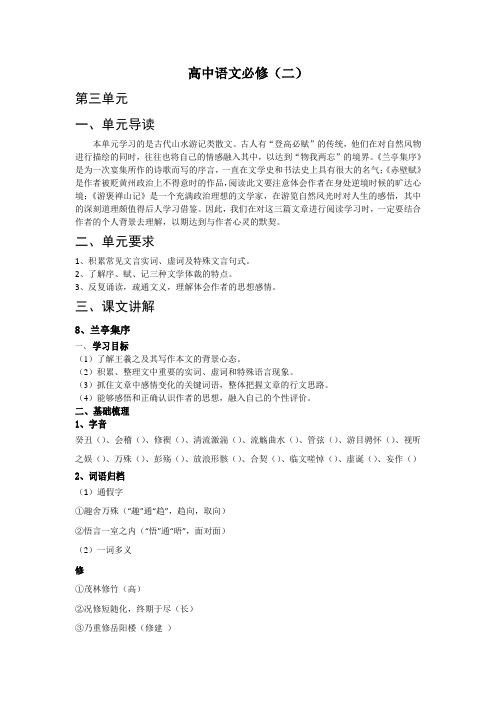必修二M3介绍和阅读
英语必修二unit3课文解读外研版

英语必修二unit3课文解读外研版
【最新版】
目录
1.英语必修二 unit3 课文解读外研版的背景和意义
2.课文的主要内容和结构
3.课文的亮点和难点
4.如何更好地理解和学习这篇课文
正文
一、英语必修二 unit3 课文解读外研版的背景和意义
英语必修二 unit3 课文解读外研版是针对英语学习者的一篇课文解读,旨在帮助学生更好地理解和学习课文。
这篇课文解读从多个角度对课文进行了深入的分析,包括课文的主题、结构、语言特点等,对于提高学生的英语阅读理解能力和写作能力都有着重要的意义。
二、课文的主要内容和结构
课文的主要内容包括了课文的主题、主要内容和结论等。
在结构上,课文采用了总分总的形式,首先介绍了课文的主题和主要内容,然后对课文的各个部分进行了详细的解读,最后总结了课文的主要观点和结论。
三、课文的亮点和难点
课文的亮点在于其深入浅出的解读方式,能够让学生更好地理解和学习课文。
同时,课文的难点在于其语言的复杂性和结构的繁琐性,需要学生有一定的英语基础和阅读能力。
四、如何更好地理解和学习这篇课文
要更好地理解和学习这篇课文,首先需要学生对课文的主题和主要内容有一定的了解,然后通过阅读课文的解读,深入理解课文的各个部分。
同时,学生还需要进行大量的阅读和写作练习,提高自己的英语阅读理解和写作能力。
人教版高中最新语文 必修二教学设计:第3课 囚绿记 Word版含答案

囚绿记
一、教学目标
1.知识目标
a.学会用知人论世的方法解读散文。
b.指导学生从文中找出关键语句,明确对“绿”的感受和理解。
c.了解象征手法,体会作者表达的深刻的思想内涵。
2.能力目标
a.品味关键句,理解文中“绿”的象征意义。
b.了解背景,明确作者的情感以及对生命的爱、对光明自由的向往、对坚贞不屈精神的赞颂。
3.情感目标
领悟作者的情感以及对生命的爱、对光明自由的向往、对坚贞不屈精神的赞颂。
二、教学要点
品味关键句,理解文中“绿”的象征意义。
三、教学难点
领悟作者的情感以及对生命的爱、对光明自由的向往、对坚贞不屈精神的赞颂。
四教学流程。
高中语文必修2第三单元(共三课)

高中语文必修(二)第三单元一、单元导读本单元学习的是古代山水游记类散文。
古人有“登高必赋”的传统,他们在对自然风物进行描绘的同时,往往也将自己的情感融入其中,以达到“物我两忘”的境界。
《兰亭集序》是为一次宴集所作的诗歌而写的序言,一直在文学史和书法史上具有很大的名气;《赤壁赋》是作者被贬黄州政治上不得意时的作品,阅读此文要注意体会作者在身处逆境时候的旷达心境;《游褒禅山记》是一个充满政治理想的文学家,在游览自然风光时对人生的感悟,其中的深刻道理颇值得后人学习借鉴。
因此,我们在对这三篇文章进行阅读学习时,一定要结合作者的个人背景去理解,以期达到与作者心灵的默契。
二、单元要求1、积累常见文言实词、虚词及特殊文言句式。
2、了解序、赋、记三种文学体裁的特点。
3、反复诵读,疏通文义,理解体会作者的思想感情。
三、课文讲解8、兰亭集序一、学习目标(1)了解王羲之及其写作本文的背景心态。
(2)积累、整理文中重要的实词、虚词和特殊语言现象。
(3)抓住文章中感情变化的关键词语,整体把握文章的行文思路。
(4)能够感悟和正确认识作者的思想,融入自己的个性评价。
二、基础梳理1、字音癸丑()、会稽()、修禊()、清流激湍()、流觞曲水()、管弦()、游目骋怀()、视听之娱()、万殊()、彭殇()、放浪形骸()、合契()、临文嗟悼()、虚诞()、妄作()2、词语归档(1)通假字①趣舍万殊(“趣”通“趋”,趋向,取向)②悟言一室之内(“悟”通“晤”,面对面)(2)一词多义修①茂林修竹(高)②况修短随化,终期于尽(长)③乃重修岳阳楼(修建)④修守战之具(整治)期①况修短随化,终期于尽(至,及)②期年之后(周,期年:一周年)③君与家君期日中,日中不至,则是无信(约定)致①所以兴怀,其致一也(情趣,情致辞)②不爱珍器重宝肥饶之地,以致天下之士(招致)③假舆马者,非利足也,而致千里(达到)临①未尝不临文嗟悼(面对,引申为阅读)②把酒临风,其喜洋洋者矣(面对,迎)③据亿丈之城,临不测之渊(面对)④故临崩寄臣以大事也(将要)次①引以为流觞曲水,列坐其次(旁边)②太上不辱先,其次不辱身(下一等)③陈胜、吴广皆次当行(按次序)④又间令吴广之次所旁丛祠中(行军途中的驻地)(3)词类活用①映带左右(环绕,名作动)②流觞曲水(使动用法,使……流;使(水)弯曲)③群贤毕至,少长咸集(形容词作名词,贤才;年少的人和年长的人)④所以游目骋怀(使……游,使……骋,动词作使动)⑤固知一死生(看作一样,数量词意动)⑥齐彭殇为妄作(齐:形容词意动,看作相等。
Book 2 M3

1. .
n.天分;天赋;才华 .天分;天赋; adj.有天赋的 有天赋的 6. vt.巡回演出;观光 巡回演出; . 巡回演出 n.游客 . n.旅游业 . adj.动人的 7. 动人的 . 8. adj.复杂的 . 复杂的 9. vt.& n.影响 . . adj.有影响的 有影响的 10. vt.录音;记录 录音; . 录音 n.记录,纪录,唱片 .记录,纪录,
5. .
必背词组: 1.be composed of be made up of consist of 2.have an influence / effect on 3, mix ...with / and ... mix up 4. be impressed with 5. impress sth. on sb. 6. go deaf 7.as well as as well may / might as well do sth.
1. 由...组成
2.对...有影响 3.混合,掺和,搞 清楚把...和...相混合 4.对...影像深刻 5. 使某人铭记某事 6.变聋 7. 1) 和...一样好 2)和,以及 也(放句末) 最好/ 不妨...
8. split up 9. make a note of make notes 10. be known as 11. at / from an early age
2. it强调句型: 强调句型: 强调句型 it is/was+被强调的成分+ that/who+原句剩余的部分 +被强调的成分+ + Ann Peter’s husband rushed 主语 her to a nearby hospital last night. 宾语 地点状语 时间状语 昨晚,安妮·彼德的丈夫立即送她去附近的医院 彼德的丈夫立即送她去附近的医院。 昨晚,安妮 彼德的丈夫立即送她去附近的医院。 强调主语 It was _________________ Ann Peter’s husband that (who) rushed her to a nearby hospital last night _______________________________________. 强调宾语 her (she) It was ________ that (who) Ann Peter’s husband rushed to a nearby hospital last night. ________________________________________________. 强调地点状语 It was __________________ that to a nearby hospital _______________________________________. Ann Peter’s husband rushed her last night 强调时间状语 It was ____________ that last night Ann Peter’s husband rushed her to a nearby hospital. _______________________________________________.
高一物理必修二第三章(人造卫星宇宙速度)完整版

【练习1】人造卫星以地心为圆心做匀速圆周 运动,下列说法正确的是( B )
A.半径越大,速率越大,周期越小 B.半径越大,速率越小,周期越大 C.所有卫星的角速度相同,与半径无关 D.所有卫星的速率均相同,与半径无关
【练习2】 如图所示,a、b、c是大气层外圆形轨 道上运行的三颗人造地球卫星,a、b质量相同 且小于c的质量,下面说法正确的是( C ) A.b、c的线速度大小相等且大于a的线速度
gma)( g
) a由(ga)=(GgMr2)知:
G
M r2
注意:近地卫星、同步卫星和赤道上随地球 自转的物体向心力来源不一样,切不可把它 们看成同类型的圆周运动来比较。
二、同步卫星变轨问题的分析与处理。
①若供=需,供求平衡—物体做匀速圆周运动.
②若供<需,供不应求—物体做离心运动.
③若供>需,供过于求—物体做向心运动.
5、向心加速度一定。
GGg )MMrr2mG2ma( gMa)rm=2m(mGvgrM2rv2rm)2=mvr2rm=rG 2mr2m=M r2r (m22Tmr ()r22(T2Tm)2)r2(2mmrfr()(222
【说明】 1、为了同步卫星之间不互相干扰,大约3°左右 才能放置1颗,这样地球的同步卫星只能有120 颗。可见,空间位置也是一种资源。
v2
r2
m v r
GM r
知r越大,v越小,r越小,v越大。
则7.9km/s是卫星最大的运行速度。
v
GM R
6.67 1021 6 1024 6.4 106
7.9km/ s
二、什么是宇宙速度?
1、第一宇宙速度(环绕速度):v=7.9千米/秒; (能够使卫星环绕地球运行所需的最小发射速度)
外研社高一英语必修二M3 Module 3 Reading and Vocabulary (Ⅱ)

3. Having worked there for 30 years, Haydn moved to
London, where he was very successful. 在那儿工作了30
年后,海顿移居伦敦,在那里他获得了很大的成功。 动词的-ing形式的完成形式having done 表示发生在主 句动作之前,和句子主语是主动关系,并作时间状语。 Having worked in the factory for half a year, he learned a lot from the workers. 在这家工厂工作了半年之后,他从工人那里学到了很 多。
1.________ audience n.听众 n.古典音乐 n.音乐家 n.宫廷
classical 2._______ musician 3.________
4._____ court
5._______ director genius 6.______
talent 7. ______ compose 8. ________
I’d like to change this dress for one in a larger size.
我想把这件衣服换成大号的。
Shall I change seats with you?
我和你换座位好吗?
Hurry up!No time to get changed!
快点!没时间换服装了!
get changed 换装 (2) change用作名词,表示“变化”时,常用作可数名 词;作“零钱;找零”讲时,用作不可数名词。 The little boy reached in his pocket and pulled out some change. 小男孩把手伸进口袋,掏出了一些零钱。
高一英语必修二unit3知识点总结
高一英语必修二unit3知识点总结高一英语必修二Unit 3 知识点总结1. 阅读理解:阅读理解是英语考试中的一个重要部分,主要通过阅读一篇文章,回答问题来测试学生的阅读能力和理解能力。
2. 单词和短语:在Unit 3中,我们学习了一些与旅行和文化有关的单词和短语,比如journey(旅行),tourist(游客),custom(习俗),tradition(传统)等。
3. 语法:(1) 一般过去时:表示过去发生或存在的动作或状态。
例:We visited the Great Wall last week.(上周我们参观了长城。
)They lived in London for three years.(他们在伦敦住了三年。
)(2) 定语从句:用来对主句中的名词或代词进行修饰的从句。
例:The book that he recommended is very interesting.(他推荐的那本书非常有趣。
)The boy whose mother is a doctor wants to be a doctor too.(那个妈妈是医生的男孩也想成为医生。
)(3) 物主代词:用来表示所属关系的代词。
例:This is my book, not yours.(这是我的书,不是你的。
)4. 句型转换:在学习英语中,我们常常需要进行句型的转换,比如从肯定句变为否定句,从陈述句变为疑问句等。
(1) 主动语态和被动语态的转换:例:They built the new stadium last year.(主动语态) The new stadium was built last year.(被动语态)(2) 肯定句和否定句的转换:例:He has finished his homework.(肯定句)He hasn't finished his homework.(否定句)(3) 陈述句和疑问句的转换:例:You have seen the film.(陈述句)Have you seen the film?(一般疑问句)5. 写作技巧:(1) 描述事物:在写作中,我们常常需要描述事物的外貌、特征或者能力。
人教版高中英语 必修二 Unit3 Computers ---Reading 课件
2 What roles do computers play in the life of human beings?
What are the new applications of the computer?
Homework
1. Finish exercise 1 on page 56. 2. Read the text again after calss
and underline the difficult points. 3.Write down your opinions about the question in the discussion.
communication
finance
Trade space rockets
mobile phones medical operation robots
The _d_e_v_e_lo_p_m__e_n_t and the applications of computers.
Development
• do housework though you are outside
I will become an intelligent remote(智能遥控) which can be used to control household appliances, such as TV, air-conditioner and light. And I also can help people do housework though they are outside. In a word, I can make people's life more convenient and comfortable.
外研社高一英语必修二M3 Module 3 Grammar
“一„„y/scarcely…when和no sooner…than句型中when 和than引导的从句不能放在主句之前。 hardly/scarcely 及no sooner如置于句首,句子要倒装。 I had hardly opened the door when he rushed out. = Hardly had I opened the door when he rushed out. =No sooner had I open the door than he rushed out.
was recorded in the UK. 一个电唱机正在播放一个在英
国录制的甲壳虫乐队的唱片。
2. similar to 与„„相似 Read the notes about the composer Tan Dun and make sentences similar to those in activity 2. 阅读关于作曲家谭盾的资料并造句,使其与活动2中句 子相似。
— Sure. Every time my dad pays the bills, he blows up. That’s inflation. —— 鲍勃,你能解释一下通货膨胀吗? ——当然可以。每一次我爸爸付账时,他就勃然大怒。
那就是通货膨胀。
【高考链接】 1. (2015· 天津高考)We need to get to the root of the before we can solve it. problem_______ 我们需要找出问题的根源才能解决问题。
3. The manager is said to have arrived back from
高一英语必修二Unit3Reading课件
总结词
掌握时态、语态和语气等语法点
详细描述
学生需要掌握英语中常用的时态,如现在时、过去时、将来时等,以及语态(主动语态和被动语态)和语气(陈述语气、祈使语气和虚拟语气)的用法。这些语法点在英语句子中起着重要的意义和作用。
VS
能够分析复杂句子的结构
详细描述
学生需要具备分析复杂句子的能力,能够识别出主句、从句以及从句的类型(名词性从句、定语性从句、状语性从句),理解句子中的主次关系以及各成分在句子中的作用。这种能力有助于提高学生的阅读理解能力和写作表达能力。
1. in particular
used to refer to the whole group or category; on the whole.
2. in general
1. It is no exaggeration to say that ...
used to emphasize that what is being said is true or accurate, even though it may seem extreme or exaggerated.
03
To develop reading comprehension and critical thinking skills through close reading and analysis of selected texts.
04
To apply the knowledge gained to personal and academic contexts, making connections between theory and practice.
The article is divided into five main sections: introduction, reading strategies, vocabulary development, application and conclusion.
- 1、下载文档前请自行甄别文档内容的完整性,平台不提供额外的编辑、内容补充、找答案等附加服务。
- 2、"仅部分预览"的文档,不可在线预览部分如存在完整性等问题,可反馈申请退款(可完整预览的文档不适用该条件!)。
- 3、如文档侵犯您的权益,请联系客服反馈,我们会尽快为您处理(人工客服工作时间:9:00-18:30)。
必修二Module 3 Music
Period 1 Introduction and Reading
课前预习
I. 依据汉语提示或首字母提示完成句子。
1.Haydn is known as “the father of the ”. (交响乐)•
2.He is a (作曲家), he teaches music and also .(作曲)
3.The play will (巡回演出) the provinces of China next month.
4.A person who directs a movie or a play is a d .
5.He showed musical t when he was very young.
6. The girl likes music and can play 3 m instruments.
7. He wants to be a p to work on the farm.
8. B is a group of musicians who perform together.
II. 选择下列词语的适当形式填空
1. Chinese t_________ enjoy Jacky Chen’s movies very much.
2. I am deeply __________by the beautiful scene in QingDao.
3. He was so lucky that he had a chance visit the ______ of the British Queen.
4. Girls often have better ________ on language learning than boys.
5. 80% of the population of China are _________.
6. G______ cannot succeed if he doesn’t work hard.
7. His father is a famous _______ of a band.
课堂学习
Fast Readi ng
Read Mozart and match the time with connected information
A. at a very early age 1. toured Europe giving concerts
B. when he was 4 2. play in a concert for the Empress of Austria
C. when he was 5 3. showed musical talent
D. when he was 6 4. Learned to play the harpsichord
E. By the time he was 14 5. Started composing music
F. When he was a teenager 6. composed many pieces for the harpsichord, piano and violin
Careful Reading
I. Read the text quickly and choose the best title
A. Three Great Austrian Composers
B. Three Great Composers of the Eighteenth Century
C. Three Great Child Composers
II. Read and judge whether these sentences are true or false
1.Hayden was known as “the father of symphony” because he is the first comp oser who
wrote symphonies.
2. Hayden’s father was a musician and taught him how to play music.
3. Hayden lived in London for 30 years.
4. Beethoven didn’t consider Haydn a good composer and learned nothing from him.
5. Beethoven spent the rest of his life in Vienna.
6. Both Haydn and Mozart were born in Austria.
7. Mozart became a big star when he was still a very little boy and gave concerts in all European countries.
8. Beethoven met Haydn in 1791 and was impressed by him.
9. Mozart said Haydn would give something wonderful to the world.
III. Read the first two paragraphs and answer the questions
1. How did Haydn change the form of symphonies?
2. How long did he work in eastern Austria?
III. Read paragraphs 3,4,5and answer the questions
1. How many pieces of music did Mozart compose?
2. How old was he when he played for the Empress of Austria?
3. How long were Mozart and Haydn friends?
IV. Read the last three paragraphs and answer the questions
1. Who taught Beethoven how to play the piano?
2. Did he stop composing when he became deaf?
课后检测
Fill in the blanks according to the text
Joseph Haydn, an Austrian ________, was born in a village and is _________ the father of the symphony. He _______ the symphony into a long piece for a large orchestra. After________ music in Vienna, he went to work at the _____ of a prince in eastern Austria. Thirty years _____, he moved to London, _____ he was very successful.
Another Austrian composer, Mozart, was born in Salzburg. _______ he only lived 35 years, he composed _________ 600 pieces of music, Mozart had musical _____ from a very early age. _________he was 14, he had composed many pieces for the harpsichord, piano and violin, ________ for orchestras. In 1781 Haydn met Mozart and was very _________ with him. They were friends ______ Mozart’s death.
Beethoven was born in Bonn, Germany. When he was very young, he learned to play the violin and the piano _____ his father. In 1791, Beethoven met Haydn, who __________ Beethoven to move to Vienna. Beethoven became very _______ in Austria, and stayed there for the ____ of his life. Even after he became _________ deaf, he ________ composing.。
